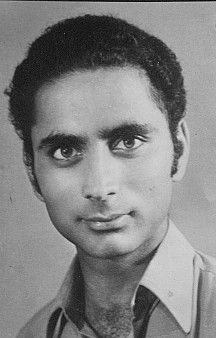Pash
This article needs additional citations for verification. (June 2015) |
Avtar Singh Sandhu | |
|---|---|
 | |
| Personal details | |
| Born | 9 September 1950 |
| Died | 23 March 1988 (aged 37) |
| Cause of death | Killed by Khalistan movement extremists |
| Nationality | Indian |
| Occupation | Poet/Activist |
Pash or Paash (September 9, 1950 – March 23, 1988) was the pen name of Avtar Singh Sandhu,[1] one of the major poets of the Naxalite movement in the Punjabi literature of the 1970s. He was killed by Khalistani extremists on March 23, 1988.[2] His strongly left-wing views were reflected in his poetry.
Early life and activism
He was born in Talwandi Salem, Jalandhar, Punjab, growing up in the midst of Naxalite; a revolutionary movement waged in Punjab against the landlords, industrialists, traders, etc. who control the means of production. He published his first book of revolutionary poems, Loh-Katha (Iron Tale), in 1970. His militant and provocative tone raised the ire of the establishment and a murder charge was brought against him. He spent nearly two years in jail, before being finally acquitted.
On acquittal, he became involved in Punjab's maoist front, editing a literary magazine, Siarh (The Plow Line). He became a popular political figure on the left during this period, and was awarded a fellowship at the Punjabi Academy of Letters in 1985. He toured the United Kingdom and the United States the following year; while in U.S., he became involved with the Anti-47 Front, opposing Sikh extremist violence.
Death
In the beginning of 1988 Pash was in Punjab for the renewal of his visa from the United States.[3] A day before leaving for Delhi, however, he was gunned down by Khalistani militants along with his friend Hans Raj on the well in his village on March 23, 1988.
Literary works
- Loh-katha (Iron-Tale) (1970),
- Uddian Bazan Magar (Following The Flying Hawks) (1973),
- Saadey Samiyaan Vich (In Our Times) (1978), and
- Khilre Hoye Varkey (Scattered pages) (1989)
Khilre Hoey Varkey was posthumously published in 1989 after his death, followed by his journals and letters. A selection of his poems in Punjabi, Inkar, was published in Lahore in 1997. His poems have been translated in many languages including other Indian languages, Nepali and English.
References
- ^ Tejawanta Siṅgha Gill (1999). Pash. Sahitya Akademi. p. 1. ISBN 9788126007769.
- ^ "Pash's father passes away in California". Hindustan Times. July 25, 2013.
- ^ Amrita Chaudhry (September 9, 2006). "BJP's rant against Paash earns it intellectual ridicule". Indian Express.
